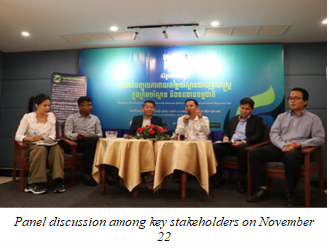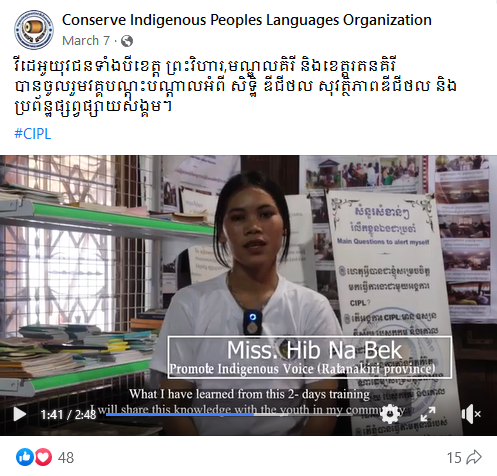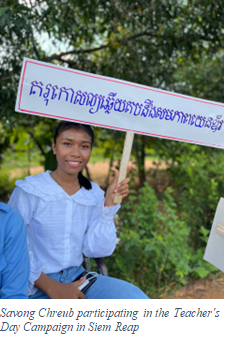In 2023, the Royal Government of Cambodia (RGC) took a significant step towards environmental stewardship by officially endorsing the Environment and Natural Resources Code (ENR Code). This landmark decision incorporated the implementation of the Strategic Environmental Assessment (SEA) as a pivotal element in driving development. Recognizing the significance of this initiative, ODC committed itself to actively supporting the enforcement, dissemination, and monitoring of SEA progress.

As part of this commitment, on November 22, ODC, with support from USAID through FHI 360, organized a highly impactful workshop/dialogue to discuss the implementation of SEA. This event brought together key stakeholders, including the Ministry of Environment’s Department of EIA and the National Council for Sustainable Development (NCSD), as well as representatives from the Ministry of Planning, the Ministry of Tourism, an EIA consultancy firm, and ClientEarth. The participation extended to over 50 Civil Society Organizations (CSOs), Community-Based Organizations (CBOs), journalists, and indigenous representatives from various provinces, all working collaboratively towards sustainable development and inclusivity.
The success of the project implementation is evident in the positive shift observed in the behavior of relevant ministries. The increased responsiveness and active participation of these ministries showcase the tangible impact of the project. This success not only marks a significant milestone in advancing SEA implementation but also underscores the project’s contribution to fostering positive changes within governmental entities, fostering a more collaborative and participatory approach to sustainable national development.
Similar Stories
Renewed purpose: Raising awareness on sexual Harassment one community at a time
Sinath is a leader of a commune-based organization (CBO) in her community. She started volunteering with Banteay Srei in 2008. Sinath wasn’t always very confident and active in her community. Living in a small community, Sinath faced pressures related to societal and family norms, stereotypes, and judgements. She took on traditional roles of taking care of her children, husband, and in-laws and didn’t feel brave enough to socialize outside the house and attend village activities or meetings. After becoming a volunteer with BS, Sinath had more opportunities to attend different events with BS. Those events – meetings, trainings, public forums, study tours – in her province and beyond have helped her to build knowledge and experience. Now, Sinath has a better understanding of leadership and her self-worth. She has also gained new skills such as public speaking, communications, planning, business, community mobilization, and facilitation. Sinath continues to equip herself with new knowledge and skills. In 2023, she learned and gained new knowledge from BS on sexual harassment. Sinath is a member of one of the five CBOs selected by BS to receive sexual harassment training. Sinath finds this new knowledge very important for her and other women in her community. After the training, she is able to recognize different types of harassment as well as harmful and discriminatory jokes often made by people around her. Sinath believes that lessons on sexual harassment can help men to understand and cease their discriminatory behavior that leads to sexual harassment. After the training, she has applied what she learned in her daily life and among her monthly saving group that she belongs to. Her peers showed a lot of interest in the subject and expressed that this would help them shift their perception and inspire some positive changes in their daily lives. For the future, Sinath plans to advocate on the issue of sexual harassment in her village by using operational funds received from Village Savings/Credit Group program. Along with the advocacy effort, she also plans to raise awareness on other topics such as importance of educating children, the impact of young marriage, gender-based violence, leadership, and positive thinking.
CIPL’s video on digital rights and social media training
The training covered the topics of human rights, digital rights, digital media, and digital trends in Cambodia. Pre and post-test results illustrated that 73% of the trainees improved their knowledge regarding digital security and rights.
Empowering education: A journey to promote gender-responsiveness in teaching through public campaigns
Coming from a lower-middle income family residing in a small village in northwest part of Cambodia, Siem Reap, 25-year old Savong Chreub is now a sophomore attending a university in her hometown. She is one of the two members in the family who is pursuing higher education. Having the opportunity for higher education is not common among low-income families who struggle to make ends meet, where girls will be mostly to be pulled out from school to help the family earn a living. Chreub is a bright and enthusiastic young woman. Not only is she dedicated to her studies, but she also volunteers passionately for the NGO. As the second child in her family to pursue higher education, Chreub is determined to break the barriers that hold back many in her community. Despite being one of five siblings, she is determined to pave her own path and achieve her dreams. Her journey towards becoming an Education Champion, youth-led social media advocator, began at a Siem Reap Education Support Team (SEST) quarterly meeting where the discussion centered on education issues, particularly focusing on teaching methods. It was there that Chreub\'s eyes were opened to the concept of gender responsiveness in teaching. She couldn\'t help but reflect on the shortcomings she had observed in the education system. Gender responsiveness was lacking in the teaching methods and there clearly were inequalities within the classroom. \"When I was in high school, a teacher mocked me for not performing well in the classroom. I acknowledge that I may not be the smartest learner. However, instead of making fun of me in front of the class, she should have given more support and attention to me in her lessons,\" she expressed. She emphasized that \"teachers should try to understand the needs and support students without judgement regardless of gender, background, race, or capability.\" Additionally, she observed her classmates have been called mean names based on their sexual orientations or class performance. Chreub joined the NGO Education Partnership (NEP) as an Education Champion, leveraging social media to advocate for gender responsiveness in teaching and learning. Despite facing initial difficulties due to her limited knowledge beyond personal experience, she dedicated hours to learning from education policies, strategic plans, research papers, and reports. She knew that to effectively advocate for change, she needed to have a strong understanding of the issues at hand. For three months straight, Chreub actively created content on social media, raising awareness about the importance of gender-responsive teaching. Her passion and commitment led her to actively participate in discussions with SEST members during quarterly meetings and other educational events. Chreub acknowledged that the issue might not be fully addressed yet, but her efforts haven\'t gone unnoticed. Teachers and friends began to pay attention. They engaged with her social media campaign, seeking to learn more about gender-responsive teaching. Additionally, Chreub finds joy in echoing the concerns surrounding this issue. She believes it has a profound impact on students, constraining their ability to unlock their full potential. As part of its main objectives of building up education stakeholders’ capacity in advocacy efforts, the youth engagement activity that Chreub has enthusiastically led has incorporated more perspectives of gender related issues in education and how youth could start taking part in tackling challenges that affect them. NEP\'s implementation of \"Promoting access to quality and inclusive education for all through public advocacy campaigns\" encourages youth like Chreub to advocate for change in education, promoting equality and quality education for all. Chreub\'s journey exemplifies the power of a single voice in initiating conversations and driving positive change in the area of education.


